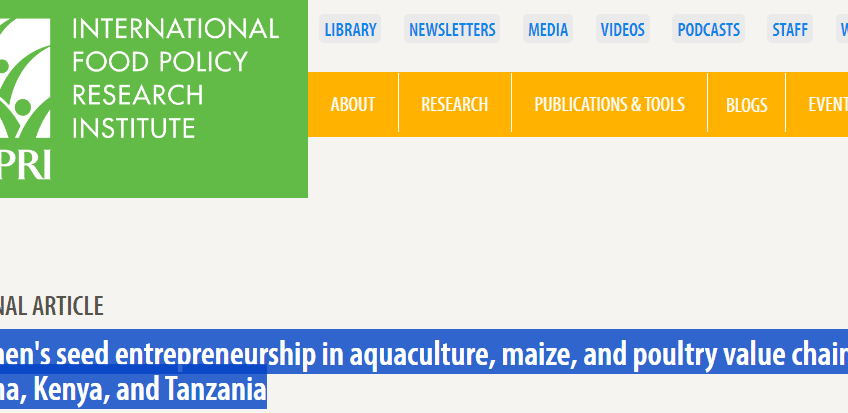Authors: by CATHY ROZEL FARNWORTH, ALESSANDRA GALIÈ, TATIANA GUMUCIO, HUMPHREY JUMBA, BERBER KRAMER AND CATHERINE RAGASA, IFPRI
Keywords: gender, entrepreneurship, maize, sotghum Ghana, Kenya, and Tanzania
“Seed systems are essential to bring good genetic material to farmers. Women farmers, however, have benefited less than men farmers from seed systems in low and middle income countries. We identify factors that inhibit and promote women’s success in seed businesses through three case studies of women’s and men’s entrepreneurship across seed-related value chains and country contexts: tilapia seed production in Ghana, marketing and trading of improved maize and sorghum seeds in Kenya, and chicken seed dissemination in Tanzania. Applying a gender lens, we use key informant interviews and focus group discussions to analyze women’s and men’s motivations to engage in seed businesses, the challenges they confront to start and build their enterprises, and prospects for sustainability and continued success. We use quantitative data to characterize the levels of empowerment of the agripreneurs sampled. For women, the results show that the social normative context of the sector is critical. Time flexibility and profitability are important considerations for women’s engagement. Furthermore, across all three country cases, family and external support are frequently key to women’s participation and success in seed agripreneurship. The article discusses the importance of government bodies, NGOs, and donors in challenging the normative context around gender resource gaps, as well as provide technical packages and training to develop business acumen. Supporting change of restrictive gender norms in non-threatening ways – such as ICTs – is key.”
Click on the following link to access the content: https://www.ifpri.org/publication/womens-seed-entrepreneurship-aquaculture-maize-and-poultry-value-chains-ghana-kenya-and
© CGIAR

